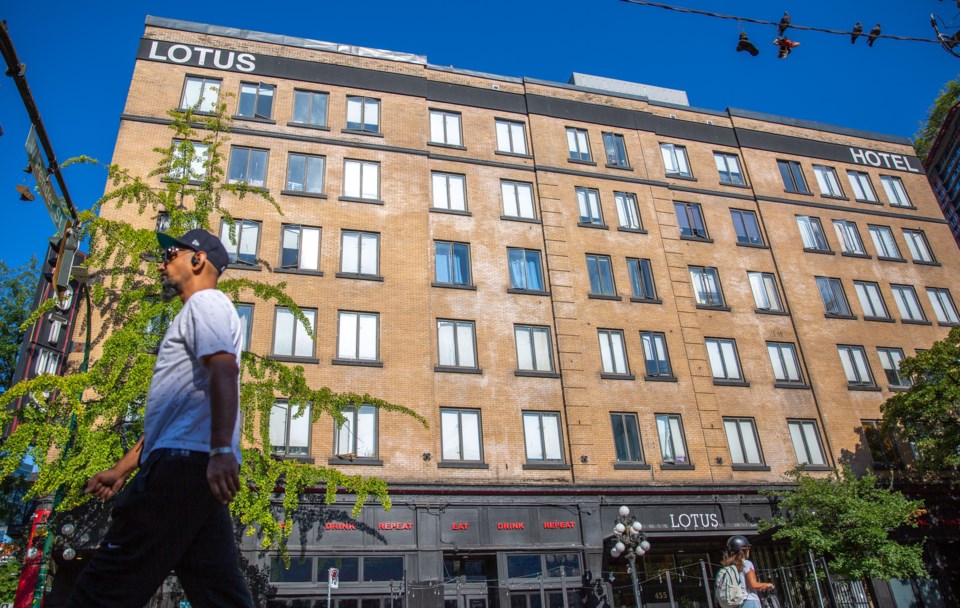Longtime low-income tenants of a 109-unit single-room-occupancy hotel in the Downtown Eastside say they are being repeatedly asked by a property management company to vacate their homes in exchange for a payout.
The requests have come via phone calls, emails, text messages and company representatives knocking on tenants’ doors at the Lotus Hotel at 455 Abbott St., according to three residents, who requested their names not be published for fear of reprisal from the owner.
“I’m scared, I’m worried, I don’t want to end up on the street,” said one man, who is in his 60s and has lived in the hotel for 22 years and pays less than $650 per month.
In the past year, he said, he has been contacted at least four times from Dennison Property Management on behalf of Lotus owner Forum Asset Management, a Toronto-based real estate investment firm.
The most recent contact came two weeks ago via a knock at his door.
“I said I’m not interested,” said the tenant, who was forced to quit a longtime job earlier this year because of health issues, but recently returned to part-time work to pay his bills.
In one of the exchanges with property management, he was offered $15,000 to move out. He provided a screenshot to Glacier Media of a text message to confirm the offer, which he refused.
With a tight and expensive rental market in Vancouver and across the region, the tenant said even if he were to leave his small space at the Lotus, he would likely have to pay twice or three times what he now pays in rent — or leave the Lower Mainland.
The $15,000, he acknowledged, is a substantial one-time influx of money, but he said it wouldn’t last long in the current rental market, particularly in Vancouver, where the vacancy rate is low and rents continue to rise.
At the Lotus, for example, three renovated furnished “studio apartments” in the 1913-era hotel, which range in size from 145 to 172 sq. feet, were advertised this week on the property management’s website for $1,995 per month.
Another 10 “micro-suites,” ranging in size from 159 to 201 sq. feet, were advertised for $1,700 and $1,800 per month, with all but three unfurnished.
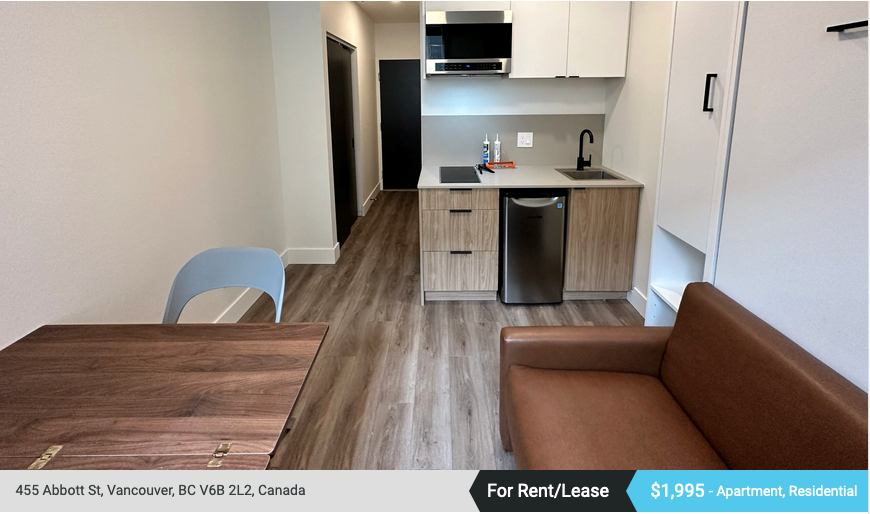
Urban professionals, students
Forum — the landlord — described the Lotus on its website as a building that caters primarily to urban professionals and students; the tenants who spoke to Glacier Media do not fit that profile, with two receiving income assistance.
The website noted the building is near the Stadium-Chinatown SkyTrain station and close to Simon Fraser University's downtown campus, the new offices of Microsoft, Salesforce, Telus, as well as Amazon's future Vancouver headquarters.
The tenant believes he is among an estimated 15 residents of the building who currently pay less than $650 per month in rent. That includes a tenant in his 50s, who has lived at the Lotus for 18 years.
That tenant shared an email he received July 19 from the property management company.
“The Lotus Hotel building ownership group have asked us to reach out to you to see if you would be interested in a buyout for your unit at Lotus Hotel Building located at 455 Abbott Street,” the email said. “The owners are willing to negotiate and will cover your moving costs.”
That email was followed by a second one July 25.
The second email, he said, triggered a panic attack that required him to seek help at St. Paul’s Hospital. He shared the medical forms from his visit to hospital, where it is noted that he began to feel unwell after receiving the email and was concerned about being evicted.
The tenant has a history of anxiety and depression, which he mentioned in a recent email to Glacier Media, politicians, government officials and a housing advocate.
“I am experiencing increasing pressure from the landlord to enter negotiations for a buyout even though I told them in an email last year that I was not interested,” he said. “In the email I stated that moving would cause me financial hardship. I stated that the issue was distressing and I would not be taking part in negotiations.”
Late-night phone call
The tenant said there has been five recorded attempts to get him to accept a buyout, with three in July. He also provided a screenshot of his phone’s call log, where “Forum EQTY PRTN” was listed as making a call to his number at 11:15 p.m. on a recent night.
Forum Equity Partners is a parent company of Forum Asset Management. Glacier Media phoned the number recorded on the tenant’s phone log, but no one picked up and there was no answering service.
“I explained that I am disabled with a hip issue and suffer from major depression and an anxiety disorder,” he continued in the email.
“They have ignored my request and continue to harass me. One could argue that they are using this information to cause me harm and either submit to their requests to move or provoke me into a situation where they would have grounds to evict.”
A letter he received in November 2022 from the compliance and enforcement unit of the Residential Tenancy Branch explained that he was under no obligation to sign an agreement with the landlord.
“The Residential Tenancy Act provides tenants with the right to quiet enjoyment that includes the right to reasonable privacy, and the right to have freedom from unreasonable disturbances,” said the letter authored by Rose Conti, a compliance and enforcement officer.
The tenant, a disabled labourer, said he wants someone in government to step in and put an end to what he alleged as predatory practices by the management company.
“Why no help?” he said. “Why are we allowing tenants to be bullied out of their homes here?”
'We don't get raises'
Another longtime tenant, who has lived at the Lotus for 20 years, estimated he has been contacted four times by management.
“It's not like they're knocking on my door every day or every month or whatever, but I can see the pattern,” said the tenant, who shared that he has been offered up to $25,000 to move out. “’Let me think about it,’ is what I usually say. I never say yes or no because you never know, right.”
Added the tenant, who is in his 60s: “I’m on welfare disability, and we don’t get raises.”
He echoed what one of the other tenants said about a tight and expensive rental market in Metro Vancouver, with concerns that any buyout money wouldn’t last long. Plus, he added, there’s a concern about finding a place where he wouldn’t be evicted, or have to move again.
Prior to moving to the Lotus, he said, he lived in a BC Housing-owned building in the Downtown Eastside that he described as a nightmare, with someone trying to kick in his door one night.
“[The Lotus] is not the best place in the world, but if I’ve got a bathroom and a fridge and cable, then I'm a happy camper,” said the tenant, who supplements his income by binning. “Everything else I can survive very easily without.”
The Lotus came to the attention of the City of Vancouver in May after a complaint that renovation work was being done at the building without permits. An inspection led the city’s chief building official, Saul Schwebs, to post stop-work orders May 25 on four units for construction without a permit.
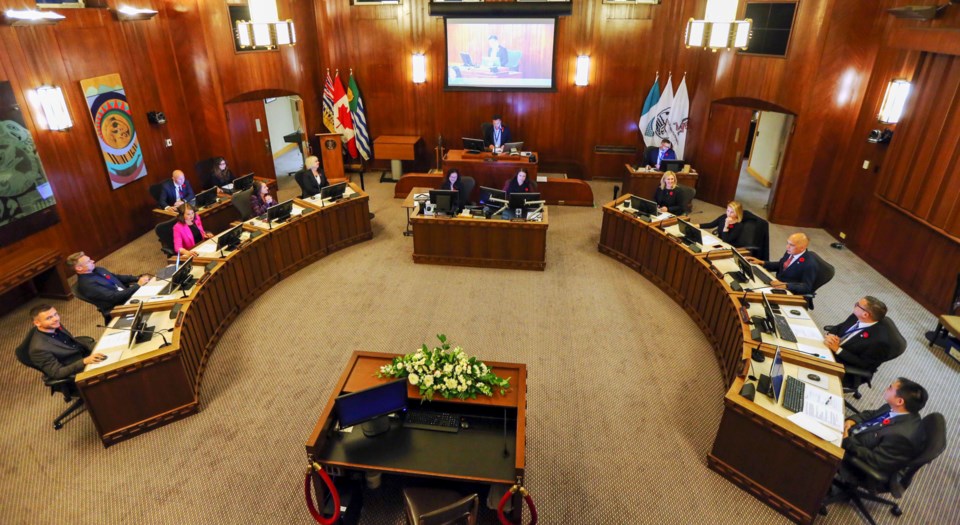
BC Supreme Court
Glacier Media requested an interview with Schwebs, but was instead emailed answers from the city’s communications department to questions related to concerns of tenants. The city said the Residential Tenancy Branch’s compliance and enforcement unit was notified of tenants’ concerns.
“The city is aware that tenants are being asked to leave in exchange for payment,” said the city, noting rights and responsibilities between tenants and landlords are governed by the Residential Tenancy Act.
The city’s single-room accommodation (SRA) bylaw protects rooms such as the ones at the Lotus from being lost to demolition or conversion, but it does not govern rental pricing, the email said.
The SRA vacancy control regulations adopted by Vancouver city council in 2021 were intended to slow speculative investment and rapidly rising rents in such buildings. The regulations also aimed to prevent “renovictions” and tenant displacement, by limiting rent increases between tenancies.
However, the amendments to the bylaw that authorized vacancy control were struck down by the B.C. Supreme Court in August 2022. The city has filed an appeal, but in the meantime, the amendments are not enforceable.
The owner of the Lotus — Forum — is described on its website as “an alternative asset manager, investor and developer with a focus on real estate, private equity and infrastructure, operating across North America.”
The company, which is located on Bay Street in Toronto, says the “enterprise value” of its assets exceeds $1.7 billion.
The first thing a viewer sees on the home page of Forum’s website is a mission statement in large red font that reads: “Our core purpose is to deliver extraordinary outcomes to our stakeholders.”
BC Assessment estimated the 2023 value of the hotel, which includes a pub, at $22,085,000.
'It's been really good for them'
Greg Spafford is Forum’s managing director of real estate management and head of the firm's real estate income and impact fund. Spafford said in an email Wednesday that contact made with tenants about buyouts is “misrepresented by some tenants and there are others who have welcomed our approach.”
He said the company, which purchased the Lotus a year and a half ago, will check in with tenants “two to three times” per year about buyouts. He described the offers as “generous,” which he elaborated on in an interview.
“We have reached agreement with half a dozen tenants so far over the past year, where they relocated in Vancouver or elsewhere, and it's been really good for them,” he said, noting one tenant moved in with his brother.
“It’s a life-changing time for him. He has some money to travel, he's moving in with family, which is where he wanted to go. Other people are moving into assisted living and that money is helpful.”
Spafford said money is not provided unless the tenant has secured other accommodation.
“There's lots of markets where there's aggressive, usually private speculative sort of landlords who will go in and renovict people, and that's just not part of our program,” he said, adding that “anyone can stay in the Lotus Hotel as long as they want.”
At the same time, he said the Lotus is a heritage building that requires substantial upgrades. The company approved Wednesday a new roof and heating system for the Lotus, which will “bring additional cooling into the building.”
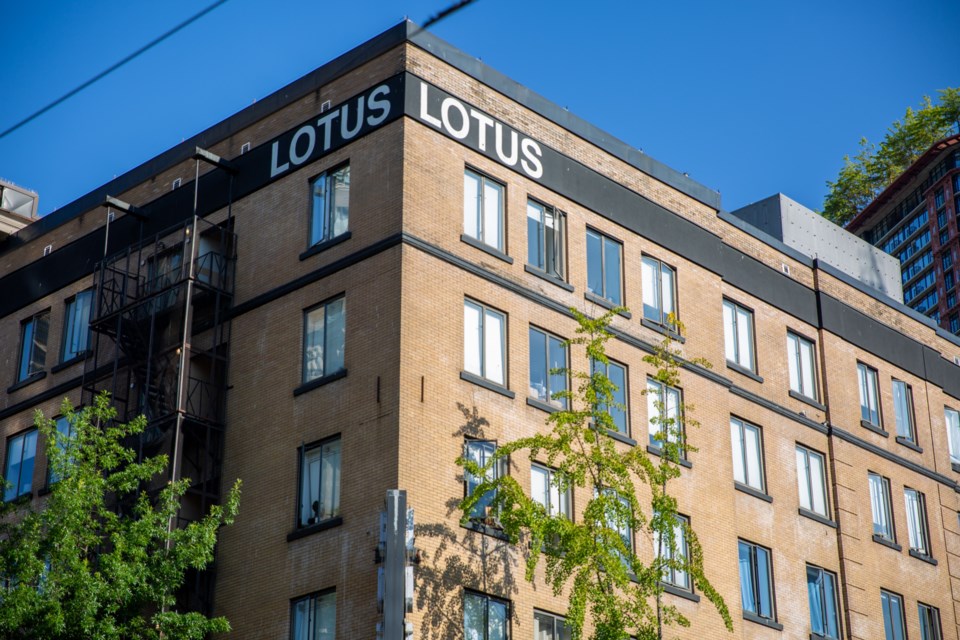
Government subsidies
When Forum purchased the building, roughly a third of the units were not renovated, he said, and the other two-thirds had ranges of renovations but “none of them at our standard.”
“So we're going to work slowly through the whole building and improve it,” he said.
He defended the price of rent for the newly renovated suites, saying keeping the rents low would require government subsidies.
Plus, he added, the rents for the renovated suites are in line with Canada Mortgage and Housing Corporation (CMHC) data on average rents for the type of accommodation in downtown Vancouver.
“They’re affordable rents,” he said. “This is the cheapest option for people in downtown Vancouver.”
Glacier Media: “Nineteen hundred bucks a month for 172 sq. feet is affordable?”
Spafford: “The next closest thing is $2,400 for a 400-sq.-foot studio, which we expect people might step up to. But in the interim, they save $500 to $700 a month.”
A scan Wednesday of downtown micro-suites listed on Craigslist found rents ranging from $1,125 per month in Gastown (without a washroom) to $1,650 per month (with a shared washroom) in the West End.
CMHC’s rental report released in January said the average asking rent for vacant units was 43 per cent higher than the overall average rent for occupied units in Vancouver. The report said the huge disparity “represents a strong disincentive to moving for existing tenants.”
Not meant to trigger people
Asked to explain the stop-work orders on four units, Spafford said it involved removal of damaged drywall during renovation and fire separation walls. Typically, he said, walls are not removed.
“When the inspector saw it, he thought that we should get a building permit,” he said. “We've submitted the paperwork. In the interim, while we're waiting for the permit, he's given us the go-ahead to continue work. This is all normal procedure. We're used to it.”
As for the late-night call to one tenant, Spafford said the company has no knowledge of the call and suggested it was spam. He said contact made with tenants about buyouts is not meant to upset people.
“Society is a stressful place and people of all walks of life experience it, so we wouldn't want to be triggering anyone,” he said. “So I'm happy to address that issue.”
Private SRO rents jump 21%
Concerns raised by tenants at the Lotus come after the city released in May its downtown core low-income housing report, which said the average rent in privately owned SROs in Vancouver is $681 this year — an increase of 21 per cent, or $120 over what it was in 2019.
The report said when a calculation of average rent is done without including what tenants pay at Chinese benevolent society-run SROs or private hotels operated by non-profits, the cost is actually $736 per month.
The city based the calculation on rent data collected from 62 privately owned and operated SROs, five private hotels operated by a non-profit and seven buildings owned and operated by Chinese benevolent societies.
“Although a large portion of the private SRO stock continues to be more affordable than average rents in a new market rental studio in the same neighbourhood, the term ‘low-Income housing’ for SROs is becoming increasingly inaccurate as average rents escalate far beyond the reach of low-income residents,” the report said.
Data from the Ministry of Social Development and Poverty Reduction indicated that 60 per cent of people residing in private SROs in 2020 were receiving income assistance. Almost half of these residents paid more than 50 per cent of their income on rent.
As a result, rents have traditionally been set at or around the shelter component of income assistance, which has remained at $375 per month for 16 years. Yet, since 2003, the number of privately owned and operated rooms at $375 decreased from 1,700 to 52.
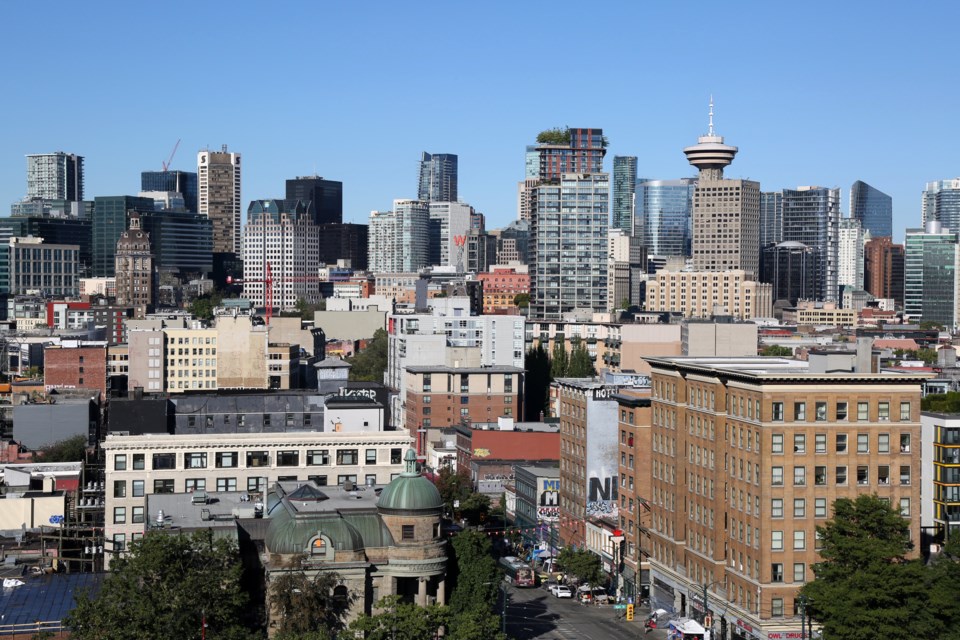
'Critical issue'
In the last three years, the number of rooms renting at twice the shelter rate ($700-plus) increased by 18 per cent, from 769 to 911 rooms, according to the report.
“Privately-owned SROs are being removed from the city’s low-income housing stock at a rapid rate due to two intensifying trends: disinvestment in the most affordable SRO buildings, leading to unsafe conditions and building closures, and rapidly escalating rents in the better maintained buildings, both of which are contributing to the ongoing homelessness crisis in Vancouver,” the report said.
The “critical issue” of tenant displacement from private SROs was highlighted in the report.
“The majority of the time, private landlords conduct light upgrades (paint walls, replace floors, etc.) at turnover that do not require an SRA permit but result in the ability to charge higher rents,” the report said.
“To accelerate turnover, some landlords pressure long-term tenants to accept cash buyouts in exchange for mutual agreements to end tenancies, leaving tenants with few housing options in the long term.”
In March, the B.C. government announced an increase to the shelter rate from $375 to $500 for a single individual, which took effect in July.
The city staff report said the increase will reduce the housing burden for tenants in private SROs, “but not significantly, as average rents still exceed the new shelter component of income assistance.”
The private SRO stock in Vancouver has decreased from 7,830 rooms in 1994 to 3,305 rooms in 2023. The Downtown Eastside has the highest rate of loss, although some of those rooms have been acquired by governments and non-profits.
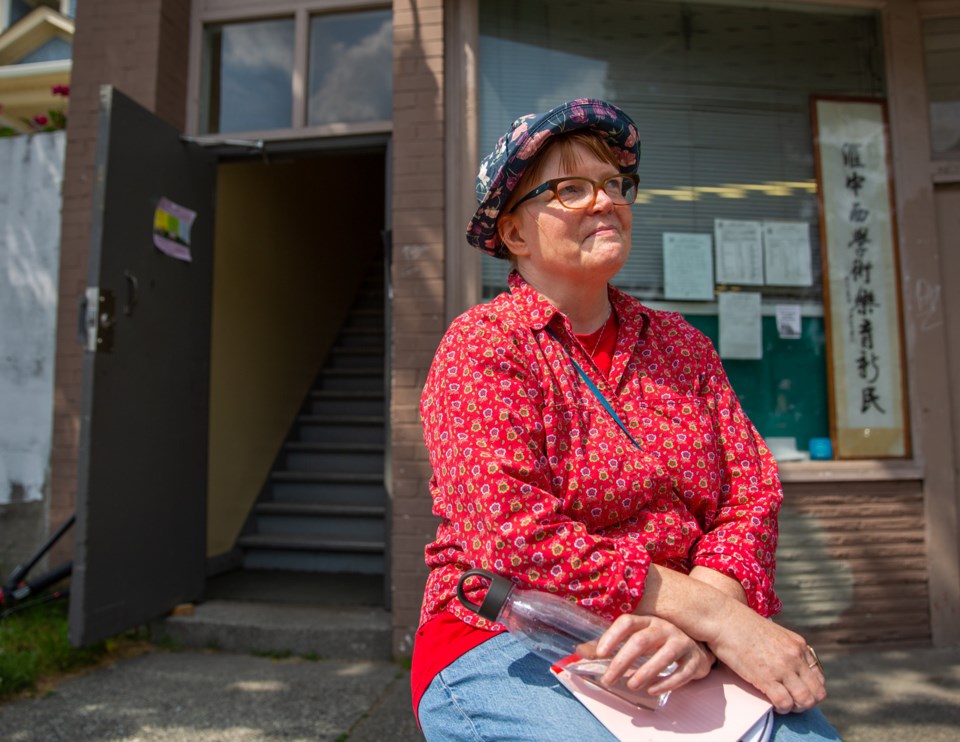
'Often accept worse conditions'
Wendy Pedersen, a longtime advocate for SRO tenants, said she was disappointed to hear residents of the Lotus are being offered buyouts, knowing that not all who accept end up in better accommodation.
“People will take risks and often accept worse conditions elsewhere in order to just have some peace of mind where nobody's on their backs,” Pedersen said. “The anxiety that people live with is really, really tough.”
Pedersen suggested tenants of the Lotus contact a legal advocate, although she said many are overworked and there isn’t enough in the city willing to take on such a case, which can be time-consuming and complex.
“People can't do this themselves, so that's a systemic problem that nobody knows how to deal with,” said Pedersen, who is the executive director of the DTES SRO Collaborative.
“[Governments] keep saying, ‘Oh, we have this thing. You just go through this thing.’ No, it’s not that easy — one, for somebody who's got anxiety and depression and, two, for somebody who doesn't understand [the Residential Tenancy Act].”
She said the low vacancy rate in Vancouver makes it a “landlord’s game right now.”
“It's to their advantage to spend time hiring people and spending money on managers who can flip those [low-rent] units because the rent gap is so huge, and so is the profit,” she said.
Note: Spafford contacted Glacier Media after this article was published to say he investigated the tenant's concern about a late-night phone call. He said he learned that the call came from the Lotus' intercom at the front door, meaning someone was trying to be buzzed in the building by the tenant.
“That was something that I was absolutely confident we did not do — we do not do that,” he said. “We'd fire people for doing that to people.”
A follow-up article to this one can be read here.
